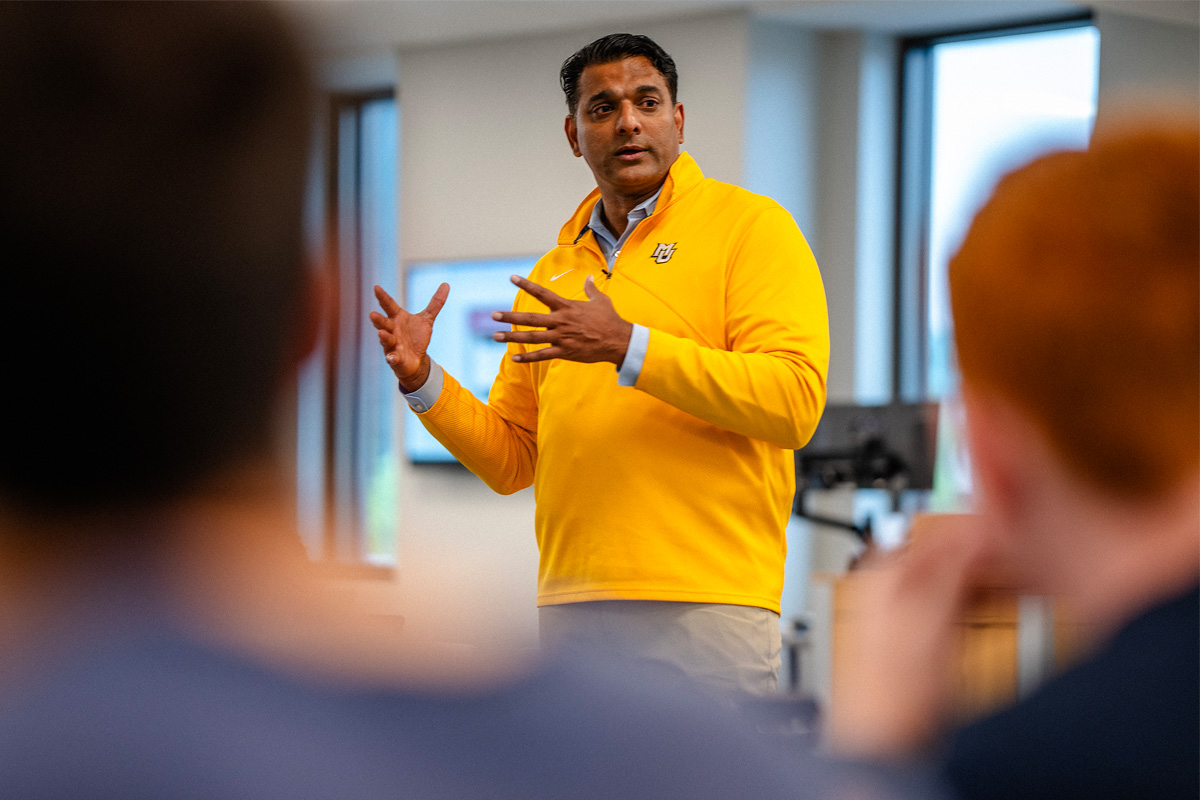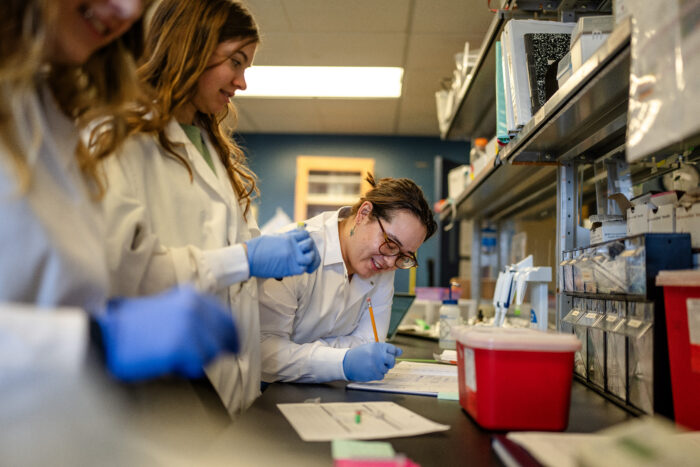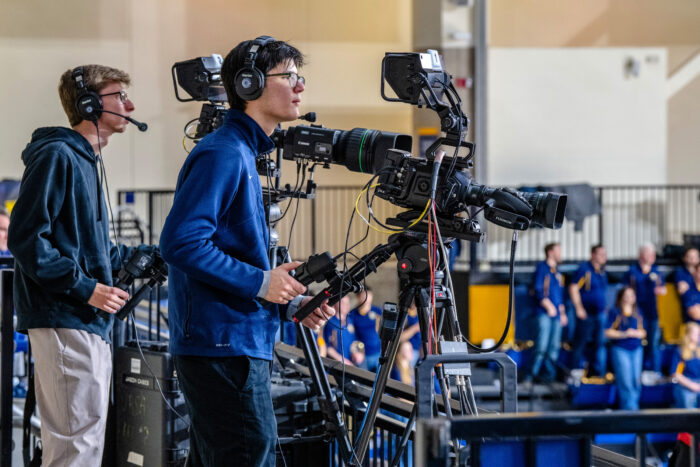Every week, Dr. Manoj Babu and his class take a 45-minute trip from Milwaukee to Racine for a two-and-a-half-hour class. They must arrive early to pass the metal detectors that stand at the threshold of their destination.
Before proceeding to the classroom, students drop their possessions in a locker. They’re not allowed to have a phone. They’re not allowed to have a backpack, keys or money.
When the group gets to their room in the Racine Correctional Institution, they take their seats and are soon joined by another group of people. This second cohort is made up of individuals who are incarcerated — they are also fellow Marquette students.
“Traditional students in this class have an experience they would never get in a conventional classroom setting,” says Babu, an assistant professor of practice in management. “It’s an experiential learning class; you can’t make up class and you can’t miss it. Being in the classroom environment in the correctional facility is the point.”
Babu’s class, Leadership Through Intentional Change, is taught to a blended class of conventional Marquette students and incarcerated student-learners as part of the Educational Preparedness Program, an initiative started at Marquette in 2018. EPP provides educational opportunities, academic support, and career-building resources to currently and formerly incarcerated students, or those impacted by the criminal justice system. The university recently received a $1.25 million gift to extend the program.
“Going to prison creates barriers in life that makes it hard for justice-impacted people to ever regain their footing,” says Darren Wheelock, an associate professor of social and cultural sciences and the director of McNeely Prison Education Consortium (hosted at Marquette). “That led me to want to study crime and punishment and ultimately get involved in prison education.”
The odds of success for people who go to prison are daunting. Roughly half of those who are incarcerated return to prison within five years of release. According to the Prison Policy Initiative, approximately 35 to 38 percent of people released from prison are still unemployed four years after release, a figure many times higher than in the general population.
“Sometimes you hear about a school to prison pipeline in the media. We want to reverse that and create a prison to school pipeline that gets people the education they need to succeed.”
Dr. Theresa Tobin, EPP director and Associate Professor of Philosophy
Many of the people who hope to change this reality were motivated to do so by personal encounters with the justice system. Babu has experience with friends and family who were once incarcerated and wanted a college education. Now, his weekly conversations with justice-impacted students in his classes only further confirm that there is a lot more to them than meets the public eye.
“The incarcerated students’ level of resourcefulness amazes me; the discussions that we have each class period are incredibly rich,” Babu says. “The incarcerated students may have done something in their lives to warrant where they are, but they’re also people who want to be better than where they are and are constantly striving to get more out of themselves while learning as much as possible through Marquette University. Leadership and intentional change are the foundations to a more rewarding lifestyle.”
“Usually, we end up talking about what we did this week that’s good for ourselves or good for others, and it’s eye-opening because you can tell how much they look forward to this class,” says Teddy Bracewell, a senior finance major in Babu’s class.
Life in a medium-security prison is miles away from the reality that most of the conventional Marquette students know. Even though many of them could probably guess that Babu’s class would be different than any other they’ve taken, it was difficult for them to understand just how different until they experienced it.
“There are all sorts of things that you don’t really think about, like how the non-incarcerated Marquette students have to take the lead on presentations because people on the inside do not have access to all the online resources that we do,” says Nicole Benedict, a sophomore finance and international business student in Babu’s class.
It’s part of what Babu calls “disparate access to information” between the student cohorts, which is a component of the larger disparity in opportunity. Babu seeks to close that gap by any means necessary, which is why he invites speakers who can expose justice-impacted students to the world beyond RCI.
Tim Hanley, former James H. Keyes Dean of the College of Business Administration, has spoken to Babu’s class for the past two years and described it as one of the most moving experiences of his life.
“As I stood in front of the class, the one thing that struck me most was the natural collaboration between our Marquette students and those from the correctional institution because they had a genuine respect for one another,” Hanley says. “We believe in moving beyond our campus boundaries to reach minds and spirits and this program fits right into that ethos.”
Babu’s is the only business class offered under the EPP. Eventually, Wheelock and his colleague Dr. Theresa Tobin, associate professor of philosophy and director of the EPP, would like to design an entire curriculum that can be taught to incarcerated students. Inside students would be able to start the curriculum while incarcerated, then transfer into a certificate or degree program either while still serving their sentence or upon release, with educational financial aid available to smooth the transition.
“Sometimes you hear about a school to prison pipeline in the media. We want to reverse that and create a prison to school pipeline that gets people the education they need to succeed after their sentence is over,” Tobin says.
“Too many of us treat prisoners like throwaway human beings and the more I work with them, the more it becomes clear that there’s so much they can offer to the rest of us,” Wheelock adds.
Reversing that stigma is the most important learning outcome of Babu’s class.
“Hopefully, this will build empathy and kindness for a group of people who desperately need it from everyone and everywhere; as a society, it is our responsibility to help those who are in need. This also aligns with the Jesuit principles here at Marquette, and that is where transformational learning is at its best.” Babu says.



